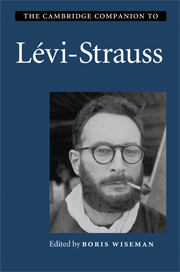Book contents
- Frontmatter
- Introduction
- Part I: Society and culture
- Part II: Myth and mind
- 5 The two natures of Lévi-Strauss
- 6 On anthropological knowledge
- 7 The limits of classification: Claude Lévi-Strauss and Mary Douglas
- 8 The local and the universal
- 9 Lévi-Strauss and the question of symbolism
- 10 Claude Lévi-Strauss’s theoretical and actual approaches to myth
- Part III: Language and alterity
- Part IV: Literature and aesthetics
- Bibliography of works by Claude Lévi-Strauss
- Index
8 - The local and the universal
from Part II: - Myth and mind
Published online by Cambridge University Press: 28 January 2010
- Frontmatter
- Introduction
- Part I: Society and culture
- Part II: Myth and mind
- 5 The two natures of Lévi-Strauss
- 6 On anthropological knowledge
- 7 The limits of classification: Claude Lévi-Strauss and Mary Douglas
- 8 The local and the universal
- 9 Lévi-Strauss and the question of symbolism
- 10 Claude Lévi-Strauss’s theoretical and actual approaches to myth
- Part III: Language and alterity
- Part IV: Literature and aesthetics
- Bibliography of works by Claude Lévi-Strauss
- Index
Summary
Lévi-Strauss is a many-sided genius, so that it is still partly an open question what part of his work will survive after he crosses the Acheron. His heritage may overstep the limits of ethnology. Any description of his work focused on existing academic disciplines could miss whatever may prove to be the essence of his work. I have chosen the theme of local versus universal knowledge, because from one perspective a group's bodily and external universe is the sum of all it can know, but each group's universe differs from all others. Yet, humanity also has a common universe: some similarities are more potent than differences. This is one great question structuralism was set up to consider. It involves analysis of exacting factual data, as well as much methodological discovery, philosophical awareness and literary descriptive power.
The peoples I studied, such as Mâori and Orokaiva, still perceived themselves, in 1960, as wholly enveloped in their own local system of thought. Today, their civilisations are not lost but their myths have been ordered by a new calculus, aimed at relating the core of their historical universe to another one, global in its range, contemporary in its forms, inspired by abundant objective knowledge and a metaphysical source of moral rules. As such transformations were not a field of anthropological study fifty years ago, it was only with the help of structural methods that I could hope to model the transformed relations of these plural universes, to discover by what hidden logic they took shape and how new frames were created to cope with new experiences.
- Type
- Chapter
- Information
- The Cambridge Companion to Lévi-Strauss , pp. 156 - 176Publisher: Cambridge University PressPrint publication year: 2009
- 1
- Cited by



